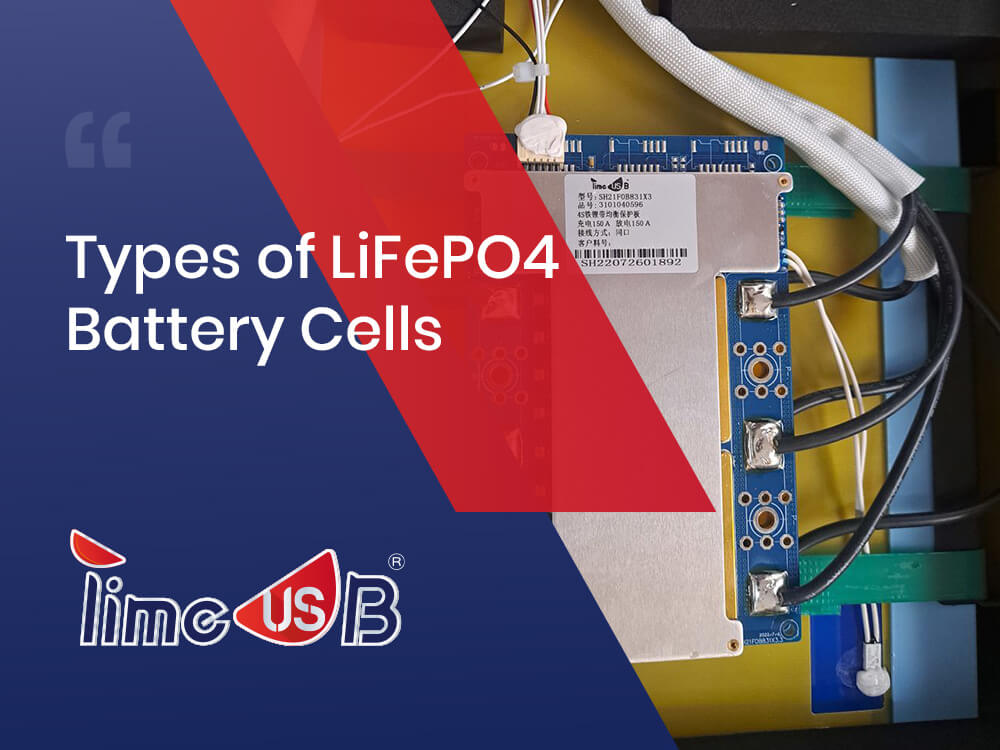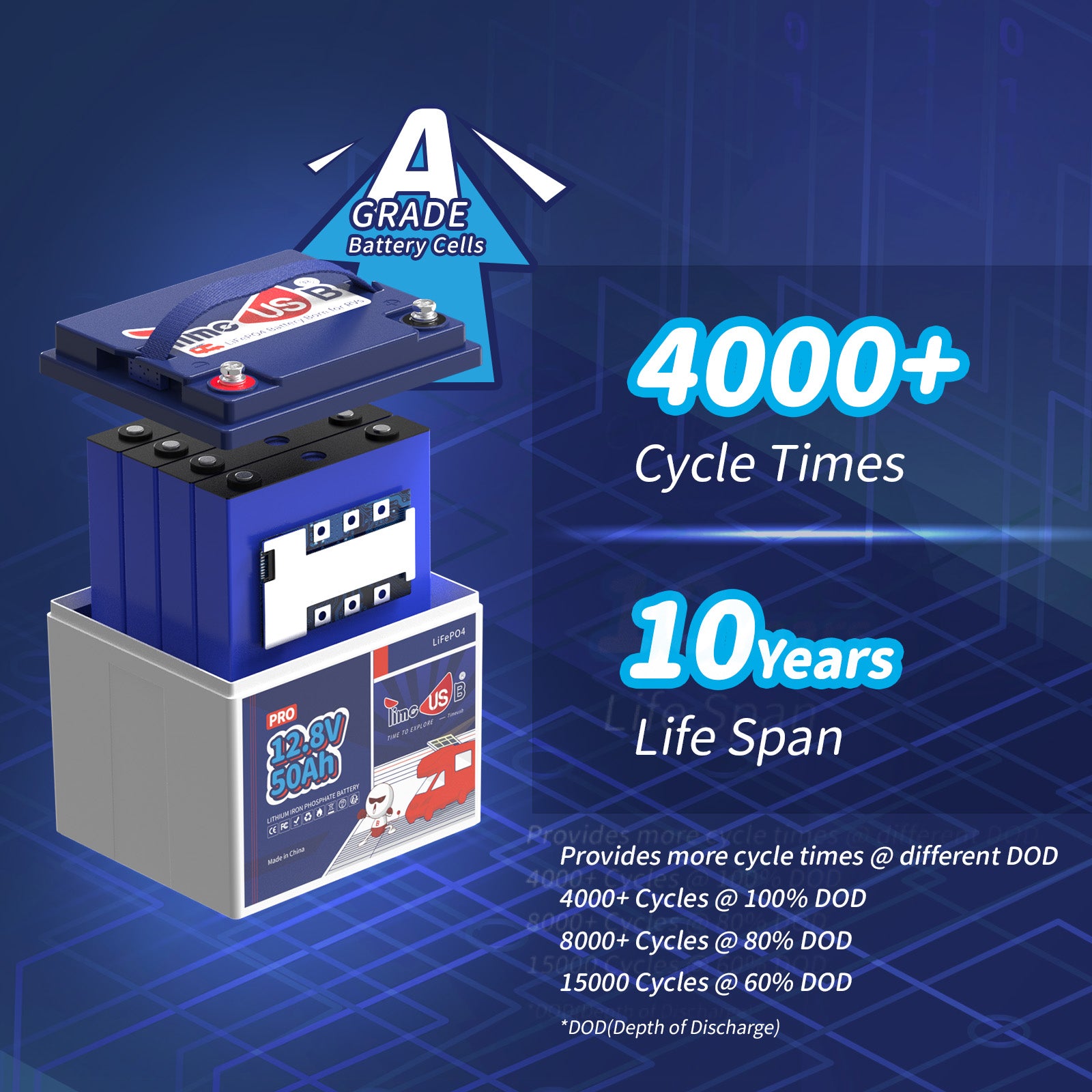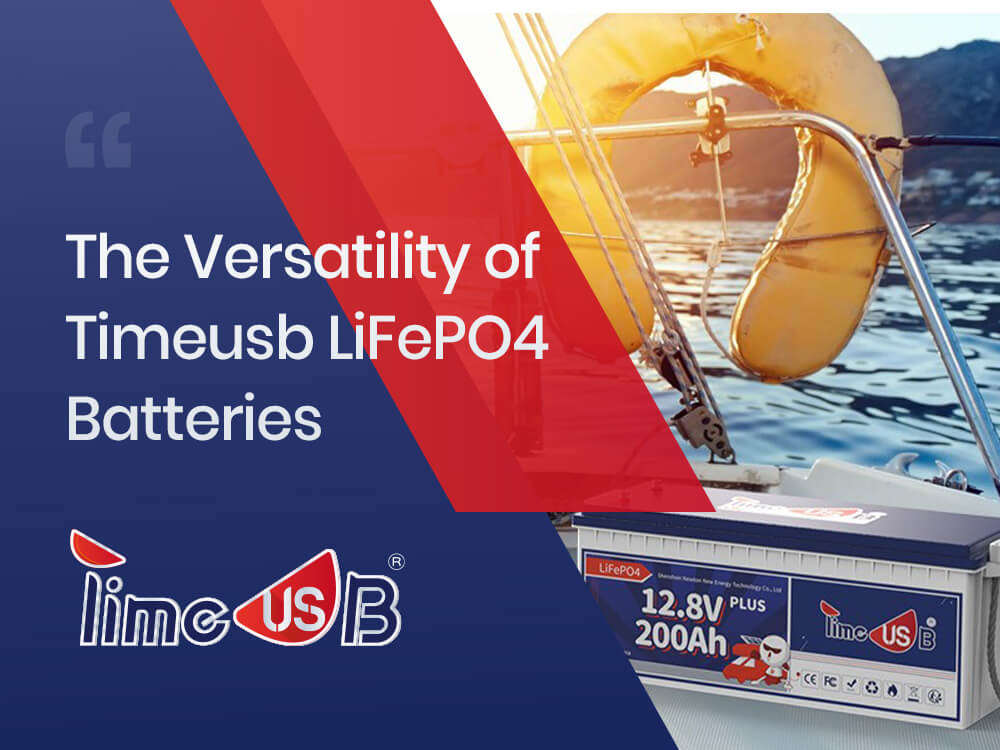[Full Guide] Types of LiFePO4 Battery Cells, Prismatic VS Pouch, Cylindrical

When it comes to choosing the right battery for your electronic devices, LiFePO4 battery cells are an excellent option to consider. These batteries, also known as lithium iron phosphate batteries, are known for their long lifespan, high energy density, and enhanced safety features compared to other lithium-ion batteries. Furthermore, LiFePO4 batteries are available in different shapes and sizes to accommodate various device requirements.
In this article, we will discuss the three main types of LiFePO4 battery cells: prismatic, pouch, and cylindrical.
What are LiFePO4 Batteries?
LiFePO4 batteries, also known as LFP batteries or lithium iron phosphate batteries, are a type of lithium battery that differ from conventional cobalt-based lithium-ion batteries. These batteries use iron phosphate as the cathode material and graphite as the anode material. This unique chemical composition offers several advantages over traditional lithium-ion batteries.
One of the main advantages of LiFePO4 batteries is their improved energy output. They have a higher energy density compared to other lithium batteries, allowing them to store and deliver more power. This makes them suitable for applications that require high energy capacity, such as electric vehicles and energy storage systems.
Additionally, LiFePO4 batteries have a longer cycle life. They can be charged and discharged thousands of times without significant degradation in performance. Timeusb's LiFePO4 batteries have the cycle life up to 4000-15000, which can be uesd more than 10 years. This makes them suitable for devices and systems that undergo frequent charging and discharging, such as power tools and portable electronics.

Another advantage of LiFePO4 batteries is their improved safety profile. The absence of cobalt in their composition eliminates the risk of cobalt leakage, which can be harmful to the environment. This makes LiFePO4 batteries more environmentally friendly and safer to handle and dispose of.
Furthermore, LiFePO4 batteries are known for their compact and lightweight design. Compared to other lithium batteries, they have a favorable weight-to-size ratio, making them suitable for applications where space and weight considerations are important, such as portable medical devices and aerospace applications.
There are 3 main types of LiFePO4 battery cells, prismatic, pouch and cylindrical. Let’s dive in.
Part 1: Everything about Prismatic LiFePO4 Cells
Prismatic LiFePO4 battery cells are popular due to their rectangular shape, which allows for easy stacking and compact packaging. This shape makes them suitable for applications with limited space, such as portable electronic devices like smartphones, tablets, and GPS systems. Prismatic cells can be customized to fit specific design requirements, making them a versatile option for manufacturers. All of Timeusb's LiFePO4 batteries are made of prismatic cells.

View Timeusb 12V 100Ah battery Tear Down
Pros of Prismatic LiFePO4 Batteries
Space-efficient: Prismatic cells have a rectangular shape that allows for efficient use of space, making them suitable for devices with limited internal space.
Enhanced safety: LiFePO4 chemistry is known for its inherent safety compared to other lithium-ion battery chemistries. Prismatic cells, with their robust and rigid design, can further enhance safety by minimizing the risk of swelling or leakage.
Higher energy capacity: Prismatic cells generally offer higher energy capacity compared to other types of LiFePO4 cells, allowing for longer running times and extended device usage.

Cons:
Limited flexibility: Prismatic cells are less flexible compared to pouch cells. Their rigid structure may restrict their use in certain electronic devices that require flexibility or conformability.
Higher cost: Prismatic cells tend to be more expensive compared to other LiFePO4 cell types due to their specialized design, manufacturing, and materials.
Manufacturing complexity: The production process for prismatic cells is more intricate compared to cylindrical or pouch cells, leading to potentially higher manufacturing costs.
Applications of Prismatic LiFePO4 Cells
Prismatic LiFePO4 cells are commonly used in various applications due to their unique features. Some of the applications where prismatic LiFePO4 cells are used include:
Electric Vehicles (EVs): Prismatic LiFePO4 cells are widely used in electric vehicle batteries due to their high energy density and long cycle life. They provide a reliable power source for EVs, ensuring sufficient range and durability.
Renewable Energy Systems: Prismatic LiFePO4 cells are suitable for energy storage in renewable energy systems like solar and wind power. They can store excess energy generated during peak times and release it during low energy production periods.
Electric Bikes: Prismatic LiFePO4 cells are commonly used in electric bikes. Their high energy density ensures a longer range per charge, and their long cycle life makes them suitable for frequent charging and discharging.
Telecom and Data Centers: Prismatic LiFePO4 cells are used as backup power in telecom and data centers. They provide a reliable and stable power source during power outages, ensuring uninterrupted operation of critical equipment.
Marine Applications: Due to their enhanced safety and higher energy capacity, prismatic LiFePO4 cells are used in marine applications like boats and yachts, trolling motor. They can power various electrical equipment onboard and provide an efficient energy storage solution.
Portable Power Banks: Prismatic LiFePO4 cells are utilized in portable power banks due to their compact size and high energy density. They provide a convenient and reliable source of power for charging smartphones, tablets, and other electronic devices on the go.
These are just a few examples of the applications where prismatic LiFePO4 cells are commonly utilized. Their versatility and advantages make them a suitable choice for a wide range of industries and technologies.
Part 2: Everything about Pouch LiFePO4 Cells
Pouch LiFePO4 battery cells have a flexible and lightweight structure, making them ideal for applications where weight and size are crucial factors. These cells are commonly used in thin electronic devices such as laptops, cameras, and wearable devices. Pouch cells offer a high level of stability and safety, thanks to their advanced design, which includes a sealed pouch and a built-in protection circuit.

Pros of Pouch LiFePO4 Cells:
Lightweight and Compact: Pouch cells are lighter and more compact compared to other types of LiFePO4 cells, making them suitable for portable devices and applications with space constraints.
Flexibility in Design: Pouch cells offer design flexibility, allowing them to be custom-shaped to fit specific device requirements, optimizing space utilization.
Better Thermal Management: Pouch cells have improved thermal management compared to cylindrical cells, as they can dissipate heat more efficiently due to their flat design.
Higher Energy Density: Pouch cells can achieve higher energy density compared to cylindrical cells, thus offering increased power storage capacity.
Enhanced Safety: Pouch cells often have built-in safety features, such as a layer of polymer laminate casing that acts as a flame retardant, reducing the risk of thermal runaway in the event of a cell failure.
Cons of Pouch LiFePO4 Cells
Less Mechanical Stability: Pouch cells are generally less mechanically stable compared to cylindrical cells, making them susceptible to puncture or damage if not properly handled or protected.
Limited Cycle Life: Pouch cells tend to have a shorter cycle life compared to cylindrical cells, meaning they may not perform as well in applications that require frequent charging and discharging cycles.
Applications of Pouch LiFePO4 Cells
Pouch LiFePO4 cells are widely used in various applications due to their unique characteristics. Here are some common applications:
Electric Vehicles (EVs): Pouch cells are extensively utilized for EV applications due to their high energy density, lightweight design, and superior thermal management capabilities. They provide longer driving range and efficient power delivery for electric vehicles.
Portable Electronics: Pouch LiFePO4 cells find application in portable electronics such as smartphones, tablets, laptops, and wearable devices. Their compact size and flexibility make them well-suited for these applications.
Energy Storage Systems (ESS): Pouch cells are often used in energy storage systems for residential, commercial, or grid-scale applications. They can store renewable energy, provide backup power, and help balance the electrical grid. Their high energy density and ability to handle high charge/discharge rates make them ideal for ESS.
Power Tools: Pouch cells are commonly used in power tools like cordless drills, saws, and other handheld devices. Their lightweight design and high power output make them suitable for these applications where mobility and performance are crucial.
Portable Medical Devices: Pouch cells are widely used in portable medical devices like portable diagnostic equipment, infusion pumps, and wearable medical devices. Their compact size and high energy density are advantageous for powering these devices.
Aerospace: Pouch cells are also utilized in the aerospace industry for applications such as satellites, unmanned aerial vehicles (UAVs), and other aerospace vehicles. Their lightweight design is desirable for these applications where weight reduction is critical.
Part 3: Everything about Cylindrical LiFePO4 Cells
Cylindrical LiFePO4 battery cells are recognized for their cylindrical shape and are widely used in high-capacity devices and electric vehicles. These cells provide excellent energy density and are capable of delivering high power output. Cylindrical cells are commonly found in power tools, electric bicycles, and electric vehicles due to their reliable performance and long cycle life.

Pros of Cylindrical LiFePO4 battery
Longer Cycle Life: Cylindrical LiFePO4 cells have a longer cycle life compared to other lithium-ion battery chemistries. They can be charged and discharged thousands of times without significant degradation in performance.
Enhanced Safety: LiFePO4 cells have a more stable chemical structure compared to other lithium-ion battery chemistries, making them less susceptible to thermal runaway and battery fires. They are considered to be among the safest lithium-ion battery chemistries available.
Improved Energy Output: LiFePO4 cells have a higher voltage output per cell compared to other lithium-ion chemistries. This means that fewer cells are needed to achieve a desired voltage, reducing the complexity and cost of battery packs.
High Power Density: Cylindrical LiFePO4 cells can deliver high power output, making them suitable for applications that require bursts of power or high continuous power output.
Environmental Friendliness: LiFePO4 cells do not contain toxic materials such as cobalt, making them more environmentally friendly. They also have a low self-discharge rate, which reduces the need for frequent recharging.
Cons of Cylindrical LiFePO4 battery
Lower Energy Density: LiFePO4 cells have a lower energy density compared to some other lithium-ion chemistries. This means that they have a lower energy capacity for a given size or weight, limiting their suitability for applications that require compact and lightweight batteries.
Limited Availability: While the availability of LiFePO4 cells has increased over the years, it may still be more limited compared to other lithium-ion battery chemistries.
Higher Cost: LiFePO4 cells can be more expensive compared to some other lithium-ion chemistries due to their manufacturing process and materials. However, as the technology continues to advance and mass production increases, the cost is expected to decrease.
Lower Operating Voltage Range: LiFePO4 cells have a lower voltage range compared to other lithium-ion chemistries, which may require additional components or circuitry to achieve the desired voltage levels.
Lower Temperature Tolerance: LiFePO4 cells have a lower temperature tolerance compared to some other lithium-ion chemistries. Extreme temperatures can affect their performance and cycle life, requiring additional thermal management systems in certain applications.
Applications of Cylindrical LiFePO4 Battery
Cylindrical LiFePO4 batteries are used in a wide range of applications. Here are some notable examples:
Backup power systems: Cylindrical LiFePO4 batteries are used as backup power sources for critical applications like data centers, telecommunications, and emergency systems. They provide uninterrupted power during outages or grid failures.
Marine applications: These batteries are used in marine vessels, including boats and yachts, for propulsion and onboard power systems. Their safety features and resistance to vibrations and impact make them suitable for maritime environments.
Off-grid power systems: LiFePO4 batteries are employed in remote areas or off-grid installations where there is limited access to the power grid. They store energy generated from alternative sources and provide electricity for lighting, appliances, and other needs.
Portable electronic devices: Some portable devices like laptops, power banks, and handheld tools use LiFePO4 batteries as a power source. They offer a longer cycle life and enhanced safety compared to other lithium-ion chemistries.
Medical equipment: Cylindrical LiFePO4 batteries are commonly used in medical devices, such as portable oxygen concentrators, infusion pumps, and patient monitoring systems. The batteries' stable chemical structure and long cycle life ensure reliable performance in critical situations.
These are just a few examples of the diverse applications for cylindrical LiFePO4 batteries. Their characteristics make them a reliable and safe choice for various industries and sectors.
FAQs about LiFePO4 Battery Cells
1. Can I mix different LiFePO4 batteries?
It is generally not recommended to mix different LiFePO4 batteries. Mixing batteries with different capacities, voltages, or levels of charge can result in uneven distribution of power and can potentially damage the batteries. Timeusb suggests if you want to connect the LiFePO4 batteries in series or parallel, it is best to purchase them within three months of your original battery purchase from the same company and same type. This ensures that the new batteries will have a similar charge cycle life as your current batteries and will seamlessly integrate with your existing system.

2. Can LiFePO4 battery cells be recycled?
Yes, LiFePO4 battery cells can be recycled. The recycling process involves extracting valuable materials like lithium, iron, and phosphate for reuse. It is important to recycle LiFePO4 batteries properly to minimize environmental impact and to comply with local regulations for battery disposal and recycling.
3. Are there any environmental concerns with LiFePO4 battery cells?
LiFePO4 battery cells are considered to be more environmentally friendly than other lithium-ion chemistries and lead acid batteries. They do not contain hazardous materials like cobalt or nickel, which can be harmful to the environment and human health. Additionally, LiFePO4 is a non-toxic and abundant material, making it a sustainable choice for battery applications.

4. Are LiFePO4 battery cells safe?
Yes, LiFePO4 battery cells are considered to be much safer than other lithium-ion chemistries. Their stable chemical structure reduces the risk of thermal runaway and battery fires. They are also less prone to issues like overcharging, over-discharging, and thermal instability. However, it is still important to handle and use LiFePO4 battery cells according to the manufacturer's guidelines to ensure safety.
Conclusion
This article has discussed 3 different types of LiFePO4 battery cells. Currently, all of Timeusb’s batteries are made of prismatic cells which also built with BMS to protect.
Hope this article can help you to identify the differences among these 3 types of cells.


![[Full Guide] The Comprehensive Guide to LiFePO4 Battery Life](http://www.timeusbpower.com/cdn/shop/articles/The_Comprehensive_Guide_to_LiFePO4_Battery_Life_757d2749-9468-4739-ac83-0960c27749b0.jpg?v=1722918256&width=1080)
